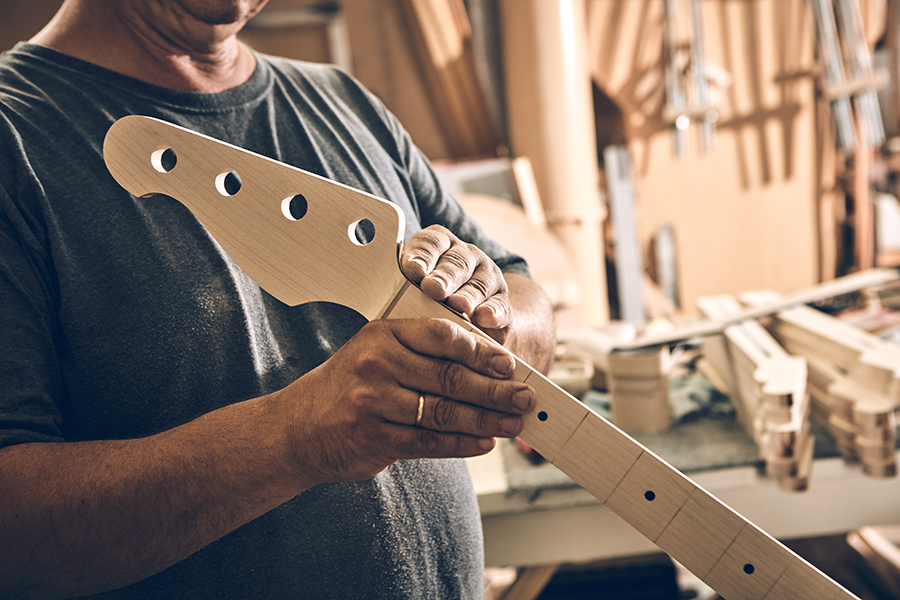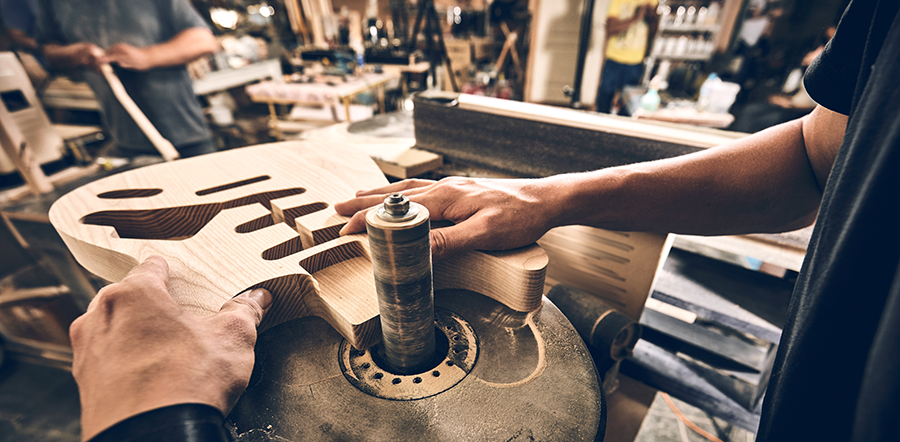A guitar luthier is a skilled craftsman who makes and repairs guitars. Like most careers in the music field, the work of a luthier isn’t something you can learn overnight. But those with a creative mind who are detail-oriented and like to tinker may find the work of a guitar luthier very rewarding. Below, we’ll talk more about what a luthier does and how you can become a guitar luthier.
What is a Guitar Luthier?
In general, a luthier is a craftsman who makes and repairs stringed instruments. Most luthiers specialize in working with one type of instrument. A guitar luthier has studied and trained in the art of guitar repair and construction. Guitar luthiers typically work in one of three settings: guitar factory, guitar repair shop, or a self-employed business.
In addition to making guitars, luthiers will repair different kinds of physical damage on the instrument’s body such as dents or fractures. They clean, seal, patch, and refinish any damaged areas so that the damage to the instrument is nearly undetectable. Guitar luthiers can also make sure that guitars that have not been used for a significant amount of time are back in playing condition.
Though most guitar luthiers learn and refine their skillset as part of an apprenticeship, many of them come to the field with some previous experience that helps them excel in the trade. Some skills that lend well to this career path include:

Blog Post
"*" indicates required fields
By submitting this form, I authorize Musicians Institute (MI) to make or allow the placement of calls, emails, and texts to me at the phone number that I have provided, including through the use of automated technology, or a prerecorded or artificial voice. I understand that I am not required to provide my phone number as a condition of purchasing any property, goods, or services. I agree to the terms of MI’s Privacy Policy. MI will not sell or rent your information to third parties, and you may unsubscribe at any time.
- Knowledge and experience in guitar design and repair
- Experience with woodworking and finishing
- Excellent acoustic listening skills
- Good interpersonal and communication skills
- Knowledge of how to run a business
Most guitar luthiers also know how to play the guitar. Though advanced skill in playing the guitar is not necessary to become a guitar luthier, knowing how to play helps the luthier get a better sense of how the guitar is used and where design plays a role in performance. It’s highly recommended that those who want to become guitar luthiers at least know the basics of strumming, tuning, and techniques for playing.

How to Become a Guitar Luthier
Though there is no one clear path to becoming a guitar luthier, there are some different ways that you can learn the skills needed to make and repair guitars. First, you’ll need to start by earning your high school diploma. If you decide to attend guitar luthier school like Musicians Institute, you’ll want to have a basic high school education to provide you with a strong foundation.
Self-Education
Many luthiers started by teaching themselves the basics of guitar making and repair. There are many resources online that can help you get started learning about the materials that are used to make instruments as well as basic guitar design principles. Even if you decide to pursue more formal education or training later on (which we recommend), it helps to start by learning the basics on your own.
Understanding the different types of wood that are used in guitar making and how they impact the instruments sound and construction is an important place to start. You should also do research on the different parts of the instrument and learn basic guitar repair issues and techniques.
Once you’ve done some initial research, you may also want to get a little hands-on experience to see if becoming a guitar luthier is really for you, especially before you invest the time and money it will take to grow and refine your luthier skillset. You can purchase a guitar making kit or buy an inexpensive guitar to tinker with. Modifying the guitar and performing basic repair tasks is a good way to see if you enjoy the work before pursuing education or apprenticeship.
One important thing to note is that teaching yourself the skills needed to be a guitar luthier requires a lot of hard work and self-discipline. Not to mention, you are not able to benefit from the wisdom and guidance of a skilled professional luthier. If you find that you respond better to formal education, you may want to try a workshop or online class before diving into more schooling or an apprenticeship.

Formal Education
There are different education options that you may want to pursue in your path to becoming a guitar luthier. There are a variety of vocational training programs that teach the skills necessary for guitar repair and building, instrument repair technology, and luthier fundamentals. Typically, a certificate or diploma program from a vocational school takes less than two years to complete and will give you the basic training you need to get started.
If you are looking for a program that is more specific to luthiers, there are also intensive programs and workshops across the United States that focus on specific aspects of instrument design and repair. Even if you plan to specialize in guitars, taking some classes that focus on other types of stringed instruments can help you expand your skill set and be a more marketable professional when you enter the workforce.
Yet another option is to take classes and workshops that are relevant to the work of a guitar luthier. For example, you may want to take woodworking classes or instrument repair workshops to learn both basic and advanced techniques that lend well to the trade. Any type of hands-on learning experience where you can learn from a professional will benefit you.
Apprenticeship
Many guitar luthiers also pursue an apprenticeship under an experienced professional. This allows them to learn advanced techniques and get on-the-job training. Cultivating relationships with others in the field is the best way to learn more about the job, gain experience in the field, and open new opportunities for yourself when it is time to find a job.
Where you complete an apprenticeship will depend on what your plans are for the future. Do you want to work in a factory making guitars? Then you may want to look for an apprenticeship opportunity that allows you to learn and work in this type of environment. If you’d rather run your own guitar repair shop one day, then you may want to start by apprenticing or getting an entry-level position in an established guitar repair shop.

